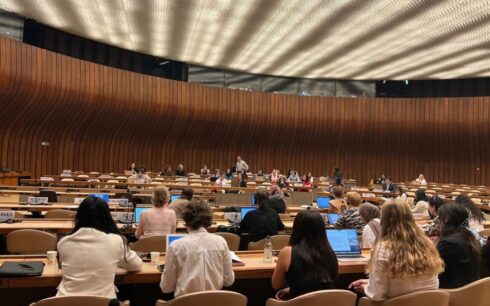A recent report by UN Women has condemned the Taliban’s policies towards women and girls in Afghanistan, describing them as part of a “meticulously constructed plan” aimed at eliminating women from public, social, and political life.
Since seizing power in August 2021, the Taliban has systematically enacted a series of restrictive decrees that have devastated Afghan women’s rights, pushing them into what the report calls an “unprecedented women’s rights crisis.”
The report, titled Fighting Erasure: UN Women’s Partnership with Women’s Organizations in Afghanistan, highlights the Taliban’s deliberate targeting of women and their attempts to remove women’s visibility and participation in Afghan society.
‘Systematic’ erasure of women’s rights
According to the report, the Taliban’s policies, which include banning girls from education beyond the sixth grade and barring women from employment in most sectors, are part of a deliberate strategy to marginalize women.
These policies have led to the closure of numerous women’s organizations and the exclusion of women from nearly every aspect of public life.
The report notes that Afghan women have not only been forced out of schools and workplaces but are increasingly confined to their homes, unable to participate in community and political life.
UN Women calls the Taliban’s actions a “meticulously constructed plan of inequality”.
The repression has caused widespread despair among Afghan women, leading to severe mental health challenges. Many women report feelings of entrapment, isolation, and hopelessness, with suicide rates among women on the rise. “We are alive, but not living,” one woman told UN rights experts, reflecting the profound sense of loss that has swept across Afghanistan.
Resilience of Afghan women’s organizations
Despite the Taliban’s efforts to dismantle the country’s gender equality framework, Afghan women’s organizations have shown extraordinary resilience. Many of these organizations have adapted to the harsh environment, continuing to provide essential services to women and girls under difficult conditions. The report highlights the determination of Afghan women to resist the erasure of their rights.
UN Women has been at the forefront of supporting these women-led organizations, working to ensure they remain operational. Nearly 200 organizations have received crucial assistance from UN Women, including financial support, technical guidance, and advocacy help. This support has enabled women-led organizations to shift their focus, providing critical services such as health care, economic support, and education to women who remain under Taliban rule.
One activist shared her story of determination, saying, “I realized Afghan women were still fighting. And I chose to be one of them.” This sentiment reflects the resolve of many Afghan women who refuse to give up despite the overwhelming challenges.
UN Women’s program: Rebuilding the women’s movement
Central to these efforts is UN Women’s program, Rebuilding the Women’s Movement in Afghanistan, which was launched in 2022. This initiative has provided flexible, core funding to over 100 women-led organizations across the country, allowing them to continue their work despite the Taliban’s repressive policies, the report said.
The program is specifically designed to reduce the administrative burden on smaller, grassroots organizations, providing them with the resources they need to sustain their operations.
To date, 113 organizations in 19 provinces have benefited from the program, which has supported 626 women staff members with steady salaries. This approach allows women’s organizations to focus on their missions—helping vulnerable women and girls—without the additional strain of seeking project-based funding that can be restrictive and short-term.
Focus on mental health and psychosocial support
The report underscores the importance of mental health and psychosocial support for Afghan women, particularly those working in activist roles or within women’s organizations.
Women in Afghanistan face daily threats of violence, harassment, and psychological trauma due to the Taliban’s policies. UN Women has responded by integrating mental health services into its programming, offering much-needed psychosocial support to activists and staff.
This includes peer-to-peer exchanges and coalition-building, which help provide emotional and psychological support for those navigating the hostile environment under Taliban rule. These efforts are vital, as many women involved in human rights work report feeling overwhelmed by the pressures and dangers they face.
Do no harm principle and sub-offices
The report says that UN Women’s approach in Afghanistan is guided by the Do No Harm principle, ensuring that interventions do not create additional risks for the women they seek to support.
The organization works closely with local partners to tailor programs that are responsive to the specific risks faced by Afghan women.
To maintain strong ties with local communities and organizations, UN Women has established five sub-offices across Afghanistan, in key provinces such as Balkh, Bamiyan, Herat, Kandahar, and Nangarhar. These sub-offices provide a critical connection between the organization and the women on the ground, ensuring that support is directed where it is most needed and that programming is tailored to local needs.
Advocating for Women’s Inclusion in Decision-Making
A central goal of UN Women’s strategy in Afghanistan is ensuring that women have a voice in decision-making processes, both at the national and international levels. Despite being excluded from political and public life by the Taliban, Afghan women’s organizations are working to make their voices heard. UN Women has played a key role in advocating for Afghan women’s inclusion in discussions about the country’s future.
In June 2024, UN Women released the Afghanistan Gender Country Profile, a comprehensive analysis of the status of women’s rights under Taliban rule. The report highlights how decades of progress on gender equality have been undone in just three years by more than 70 decrees and policies targeting women. UN Women also gathered 70 submissions from women-led organizations in Afghanistan, which were presented at the 2024 UN-convened meetings on Afghanistan’s future in Doha





